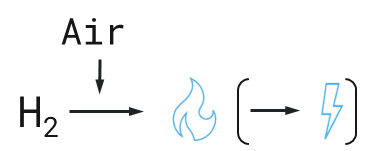- Mareike Deggelmann
- 26.01.26
- 3 min
- Funding advice, Agrifood, Bioeconomy
Your contact person
Dr Günter Hohmann
Hydrogen serves as an efficient energy storage medium and is used in electrical power generation, heat production and chemical processes. Hydrogen plays a particularly important role in the chemical industry, e.g. in ammonia production and the conversion of carbon monoxide to methanol as a liquid hydrogen storage. In this blog article, learn about hydrogen's contribution to heat generation, how green hydrogen reduces emissions in industry, and how EU funding from the Innovation Fund is driving the development of hydrogen applications.
Fuel cells convert hydrogen electrochemically into electricity. In these cells, hydrogen and oxygen react to form water, so the reverse reaction of the electrolyzer is used here. At the anode, hydrogen is converted to protons. At the cathode, oxygen is reduced. There are different types of fuel cells:
Hydrogen can also be burned to generate heat that can be used in processes, furnaces and heating systems. Combustion of hydrogen to produce heat is more efficient than prior conversion to electricity. Excess heat can also be used to generate electricity in cogeneration plants.

Figure 1: Hydrogen is burned with the addition of (atmospheric) oxygen and heat is produced.
Establishing hydrogen as a heat source, even as a natural gas-hydrogen mixture, requires the development of suitable firing systems and investments in energy-intensive industrial processes.
In the chemical industry, H2 is needed for ammonia production. Ammonia is a basic ingredient for the production of fertilizers, pesticides, lubricants and medicines. Hydrogen also plays a role in the production of fuels and methanol by reducing carbon monoxide. In addition, hydrogen is of great importance in many sectors for climate-neutral industrial production processes, for example to replace petroleum as a raw material.
In order to establish hydrogen applications, the production of green hydrogen, and associated renewable energy supply, hydrogen infrastructure and hydrogen consumption need to be scaled. This will require automated processes to produce the products in appropriate quantities. Scaling must take into account factors such as the associated space and personnel requirements, the capacities of suppliers and customers, and much more.
|
|
||
|
How can the Innovation Fund support hydrogen applications? |
We will be happy to advise you on the selection of the right funding program and support you in the application process. EurA AG Aachen and Herten have many years of experience in successfully applying for subsidies and providing technical advice on the subject of hydrogen.
Text: Georg Beckmann

Your contact person
Dr Günter Hohmann
EurA AG
T- 079619256-0Max-Eyth-Straße 2
73479 Ellwangen
info@eura-ag.com